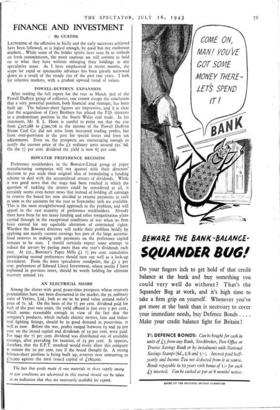FINANCE AND INVESTMENT
By CUSTOS
LAUNCHING of the offensive in Sicily and the early successes achieved have been followed, as is logical enough, by good but not exuberant Markets. , While some of the bolder spirits have seen fit to embark on fresh commitments, the more cautious are still content to hold on to what they have without enlarging their holdings in any speculative sense. As I have emphasised in recent months, the scope for rapid or spectacular advances has been greatly narrowed down as a result of the steady rise of the past two years. I look for selective markets, with a gradual upward trend of values.
POWELL-DUFFRYN EXPANSION After reading the full report for the year to March 31st of the Powell Duffryn group of collieries, one cannot escape the conclusion that a very powerful position, both financial and strategic, has been built up. The balance-sheet figures are impressive, and it is clear that the acquisition of Cory Brothers has placed the P.D. interests in a predominant position in the South Wales coal trade. In his Statement, Mr. E. L. Hann is careful to point out that the rise from £207,088 to £290,706 in the income of the Powell Duffryn Steam Coal Co. did not arise from increased trading profits, but from over-provision in the past for special losses and from tax adjustments. Even so, the prospects are encouraging enough to justify the current price of the Li ordinary units around 22s: 6d. On the 71 per cent. dividend the yield is now 6f per cent.
BOWATER PREFERENCE DECISION
Preference stockholders in the Bowater-Lloyd group of paper manufacturing companies will not quarrel with their directors' decision to put aside their original idea of formulating a funding scheme to deal with the accumulated arrears of dividends. While it was good news that the stage had been reached at which the question of tackling the arrears could be considered at all, it certainly seems even better news that instead of holding all earnings in, reserve the board has now decided to resume payments in cash as soon as the accounts for the year to September 30th are available. This is the most straightforward approach to the problem, and will appeal to the vast majority of preference stockholders. Already there have been far too many funding and other reorganisation plans carried through in the exceptional conditions of war when no firm tiaiis existed for any equitable alteration of contractual rights. Whether the Bowater directors will tackle their prdblem boldly by applying not merely current earnings but part of the large accumu- lated reserves in making cash payments on the preference capital remains to be seen. I should certainly expect some attempt to reduce the arrears by paying more than one year's dividends each year. At 23s., Bowater's Paper Mills Li 71 per cent. cumulative participating second preferences should turn out well as a lock-up investment. From the more speculative standpoint, the Li 5 per cent. preferences of Edward Lloyd Investment, whose merits I have explained in previous notes, should be worth holding for ultimate recovery around xis.
AN ELECTRICAL SHARE Among the shares with good peace-time prospects whose recovery potentialities have not been discounted in the market, the 5s. ordinary units of Veritys, Ltd., look to me to be good value around today's price of 7s. 3d. On the basis of the 71 per cent. dividend paid for each of the past two years, the yield offered is just over 5 per cent., which seems reasonable enough in view of the fact that the company's products, which include electric motors, fans and indus- trial lighting fittings, should be in good demand in peace-time as well as now. Before the war, profits ranged between 15 and 29 per cent, on the issued capital and dividends of io per cent. were paid. For 1942 the 73. per cent. dividend was distributed out of available earnings, after providing for taxation, of 23 per cent. It appears, therefore, that the E.P.T. standard would easily allow this company to restore the to per cent. rate if the board thought fit. A strong balance-sheet position is being built up, reserves now amounting to k70,000 against the total issued capital of L18o,000.
The fact that goods made of raw materials in short supply owing to war conditions are advertised in this journal should not be taken as an indication that they are necessarily available for export.


























 Previous page
Previous page